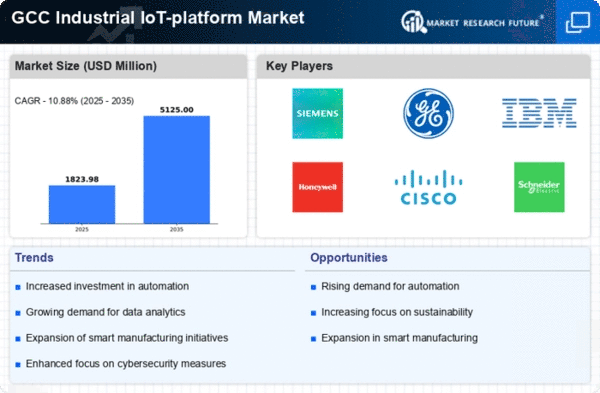Rising Demand for Automation
The industrial iot-platform market is experiencing a notable surge in demand for automation across various sectors in the GCC. Industries are increasingly adopting automated solutions to enhance operational efficiency and reduce human error. This trend is driven by the need for real-time data analytics and improved decision-making processes. According to recent estimates, the automation market in the GCC is projected to grow at a CAGR of approximately 10% over the next five years. This growth is likely to propel the industrial iot-platform market, as companies seek to integrate IoT technologies to streamline their operations and achieve higher productivity levels.
Growing Focus on Data Security
As the industrial iot-platform market expands, the emphasis on data security becomes increasingly paramount. With the rise of cyber threats, industries in the GCC are prioritizing the implementation of robust security measures to protect sensitive data. This focus on cybersecurity is likely to drive the adoption of advanced IoT platforms that offer enhanced security features. Companies are investing in solutions that ensure data integrity and compliance with regulatory standards, which could lead to a projected increase in the market size by approximately 15% over the next few years.
Enhanced Connectivity Solutions
The proliferation of enhanced connectivity solutions is significantly impacting the industrial iot-platform market. The advent of 5G technology in the GCC is expected to revolutionize the way industrial devices communicate, enabling faster data transmission and improved reliability. This technological advancement is likely to facilitate the deployment of IoT applications across various industries, including manufacturing and logistics. As connectivity improves, the industrial iot-platform market is anticipated to witness substantial growth, with estimates suggesting an increase in market penetration by 20% within the next three years.
Investment in Smart Infrastructure
Investment in smart infrastructure is a critical driver for the industrial iot-platform market in the GCC. Governments and private sectors are allocating substantial funds towards developing smart cities and advanced industrial facilities. This investment is expected to reach around $100 billion by 2030, focusing on integrating IoT solutions for better resource management and operational efficiency. The push for smart infrastructure not only enhances connectivity but also fosters innovation in the industrial sector, thereby creating a conducive environment for the growth of the industrial iot-platform market.
Emphasis on Workforce Skill Development
The industrial iot-platform market is also being driven by an emphasis on workforce skill development in the GCC. As industries adopt advanced IoT technologies, there is a growing need for skilled professionals who can manage and operate these systems effectively. Educational institutions and companies are collaborating to create training programs aimed at equipping the workforce with the necessary skills. This focus on skill development is likely to enhance the overall adoption of industrial IoT solutions, as a well-trained workforce can leverage these technologies to optimize operations and drive innovation.
















